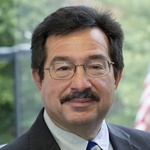
Claudio Divizia/Shutterstock.com
Enhancing the Citizen Journey Is a Government Imperative
Customers expect online, real-time service.
As websites, 24/7 customer support, mobile apps and other tools open up convenient options for people to interact, the collective expectation for customer service has changed. Whether we are communicating with work associates or friends and relatives, transacting business, gaming or streaming online content, real-time access to information and services is no longer an added perk, but a necessity. This is especially true of citizens' interactions with government.
Expectations have grown for the citizen journey—the experience a person has when seeking government assistance, from beginning to end—and it is imperative that agencies deliver. It is also an opportunity for those in the government services industry to find ways to help serve citizens more effectively.
Citizen-centric experiences are priority for the Obama administration and a key tenet of modern government. In 2011, President Obama issued an executive order requiring federal agencies to improve their customer service. “With advances in technology and service delivery systems in other sectors, the public’s expectations of the government have continued to rise. The government must keep pace with and even exceed those expectations,” the directive said. The President’s Management Agenda focuses on creating government-industry partnerships that improve services delivered to citizens.
Beth Cobert, deputy director for management at the Office of Management and Budget, echoed the president’s sentiment last spring, when she testified before the Senate Homeland Security and Governmental Affairs Committee. She said the administration is committed to an effective government that is focused on delivering a world-class customer service experience for citizens and businesses. “Americans today live in a world where almost anything can be accessed instantly from a phone or computer,” Cobert said. “To deliver effective services, government transactions need to be available in the simple, accessible and easy-to-use formats that our citizens and businesses expect."
The president has called for streamlined service delivery and improved citizen experience, which will require strong leadership, a governmentwide focus and collaborative partnerships with industry. It will require better-designed, restructured and more efficient business processes—enabled by innovative technology. Government must be open when soliciting, receiving and incorporating feedback from citizens on the experiences they have when accessing services. It will also require a fundamental shift in the way we think about the citizen journey and embrace the variety of ways people access government services.
Many agencies have created offices of citizen services or citizen engagement to provide effective and easy access to information. The General Services Administration, for example, has formed a new organization under its Office of Citizen Services called 18F, named for the agency’s Washington address. Its stated goal is to build “effective, user-centric digital services focused on the interaction between government and the people and the businesses it serves.” Groups such as these are important champions for creating a better citizen experience.
The bumpy launch of HealthCare.gov is an example of what can happen when customer expectations are not met. For the first time in history, it compelled the president to address problems with customer service, especially in the case of multichannel support. This reaction from the top leader in government shows how important the citizen journey has become and how expectations have evolved. As a new generation of government program participants emerges, it will be more important than ever to not only handle their needs, but to meaningfully engage them.
Improving the citizen journey will require every agency at every level of government to understand the demographics of the citizens they serve and tailor an approach that meets their needs and expectations. Medicare participants, for example, have much different service needs than those applying for a passport. Deliberate analysis is needed to determine how, when and where government employees and technology can best meet citizens’ needs. When it's effective, the citizen journey becomes a better experience for all.
Thomas Romeo is president of MAXIMUS Federal Services.
Image via Claudio Divizia/Shutterstock.com)
NEXT STORY: President Backs Government-Run Internet Networks







